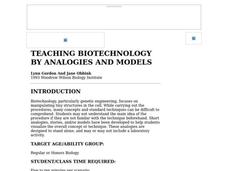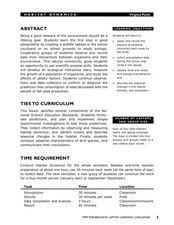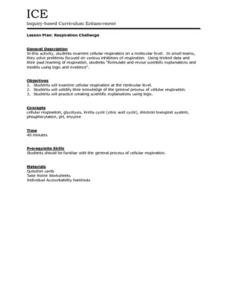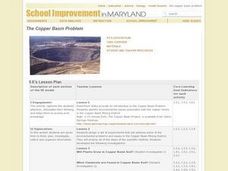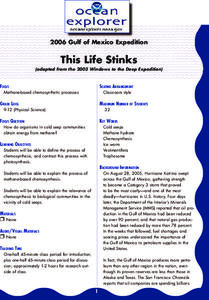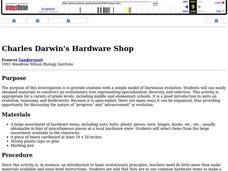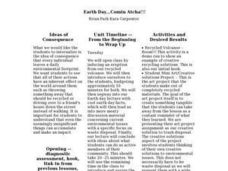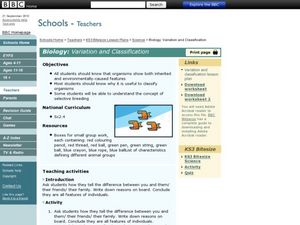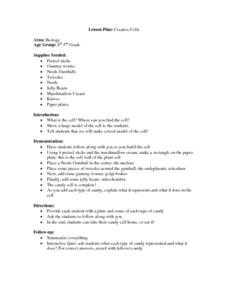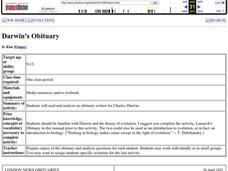Curated OER
Vertebrate Skeletons
In this biology worksheet, students examine the human skeleton and then classify animal bones according to their similar function.
Curated OER
Factors Affecting Plant Growth
Students determine the physical and chemical factors that affect plant growth. In this biology lesson, students explain the role of hormones in plants. They investigate how competition with other plants affect their growth.
Curated OER
Teaching Biotechnology By Analogies And Models
Students explore biotechnology by analogies and models. They read several provided scenarios and answer questions to discover some basic concepts of biotechnology.
Curated OER
The Environment and Interactions of Living Organisms
Young scholars study the environment and interactions of living organisms. They identify abiotic and biotic factors and create a foldable and vocabulary cards. They create a poster illustrating soil and watch a video to study symbiosis.
Curated OER
Habitat Dynamics
Students develop an interactive diary to record bird seed consumption. In this habitat lesson, students predict and record the amount of birdseed eaten each week by birds.
Curated OER
Dissecting Squid
Second graders explore biology by dissecting an animal. In this squid anatomy lesson, 2nd graders collaborate in pairs to investigate the inner body systems of a recently deceased squid. Students utilize plastic knives to cut the squid...
Curated OER
Science Reproduction
Students discuss the different stages of mitosis. In this biology instructional activity, students work in pairs as they draw and diagram the stages of cell division. They discuss reproduction using pro, meta, ana and telophase.
Curated OER
Daisyworld: Stella Mac or PC
Students investigate Daisyworld, a very simple planet that has only two species of life on its surface - white and black daisies, and bare ground. They construct a Stella model of Daisyworld and perform guided experiments to explore the...
Curated OER
Respiration Challenge
Learners use limited data and their prior knowledge to solve problems focused on various inhibitors of respiration in this lesson on cellular respiration in a molecular level. This lesson includes a student handout and a pre-activity...
Curated OER
Cardiac Arrest! Using Forensics to Investigate Cardiovascular Anatomy and Function
Learners identify the different parts and functions of the cardiovascular system. For this forensics lesson, students collect and analyze evidence on a fictional crime. They describe different causes of cardiac arrest.
Curated OER
Biology: living Things and their Environment
Students recognize that organisms depend on other organisms. In this organism lesson, students understand symbiotic relationships and competition. Students explain food chains and food webs. Students understand that change is always...
Curated OER
Genetic Analysis
Young scholars formulate a hypothesis regarding the validity of the current status of the Arizona Hedgehog cactus as a distinct variety of cactus. They design a procedure to isolate DNA from the tissue of plants, given a list of...
Curated OER
The Copper Basin Problem
Learners view a video about how human actions impact the environment. They design a set of experiments to address some of the problems and issues raised by the video.
Curated OER
This Life Stinks
Chemosynthetic communities of cold seep areas are considered in this lesson. Working in collaborative groups, marine biology or oceanography learners research and prepare a report about oxidation-reduction reactions involved with...
Curated OER
Classification: Dichotomous Key
Students investigate the classification process and nomenclatures used for classifying organisms. They study dichotomous keys to identify organisms with 90% accuracy. Students organize information regarding the relatedness of species.
Curated OER
Charles Darwin's Hardware Shop
Using an assortment of hardware, junior biologists explore the theory of evolution. They consider how simple pieces of hardware might be changed into similar items and display their discoveries on a poster. The activity would be...
Curated OER
Earth Day...Comin Atcha!!!
Students explore the idea of consequence that every individual leaves a daily environmental footprint. They read articles about creative solutions to solid waste issues and then create an artwork from household trash.
Curated OER
Genes, Environments, and Behavior 2
Students explore the genetic and environmental factors that interact to produce variation in behavior across a population. They are introduced to the various approaches scientists use to explore this interaction. Students explore how...
Curated OER
Biology: Variation and Classification
Students investigate classification of different animal groups. In this biology lesson plan students list characteristics of themselves and others they know to show differences and how they are classified. Students then answer questions...
Curated OER
Biology: Creative Cells
Students use various snacks to make large models of human cells. Items such as gumballs, gummy worms, and jelly beans represent the nucleus, golgi bodies, and mitochondria. As each piece of candy is added, the teacher explains what it...
Curated OER
Creative Ways To Teach Evolutionary Concepts
Young scholars explore evolutionary concepts in cartoons and lab activities. They describe and explain evolutionary concepts featured in a cartoon and participate in laboratory activities.
Curated OER
How Does Meiosis Lead To a Fetus?
Students discuss the stages of meiosis. In this life science lesson plan, students create an illustration of each stages. They write a short story about a character that went through meiosis.
Curated OER
'Neuro-Bingo'
Students discuss the nervous system and its pathology. They are then able to explain what neural physiology is. They use this game to further help them to develop clear meaning of the nervous system.
Curated OER
Darwin's Obituary
Learners read and analyze an obituary written for Charles Darwin. They make a list of facts about Darwin they learned from the obituary. Students compare Lamarack's theory to Darwin's.




